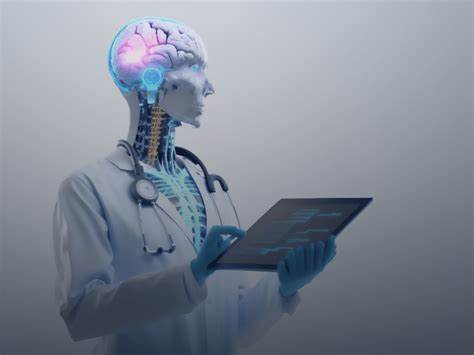AI & Healthcare: Now & Beyond
October 17, 2024 | Thursday | Views | By Hradhaya Bhushan Parchure
It will be many years before AI replaces humans for broad medical process domains
image credit- shutterstock
There are already a number of research studies suggesting that artificial intelligence (AI) can perform as well as or better than humans at key healthcare tasks, such as diagnosing disease. According to Morgan Stanley, biotechs are implementing AI and machine learning to drug development, potentially creating dozens of new medicines and a $50 billion market over the next decade.
For instance, one of the leading COVID-19 vaccine developers and pharmaceutical companies, Pfizer, uses the IBM Watson Machine Learning platform to improve drug discovery quicker, cheaper, and effective.
The global artificial intelligence in the healthcare market was valued at $16.3 billion in 2022 and is expected to grow at a CAGR of 40.2% to reach $173.55 billion by 2029. North America has a dominant position in the healthcare artificial intelligence market. Second-largest region in the AI healthcare market is Europe. Further, the AI expenditure in India increased by over 109 percent in 2018, amounting to $665 million, and is anticipated to reach $11.78 billion by 2025, going on to contribute $1 trillion to India's economy by 2035.
Currently, the most common roles for AI in medical settings are clinical decision support and imaging analysis. Clinical decision support tools help providers make decisions about treatments, medications, mental health and other patient needs by providing them with quick access to information or research that's relevant to their patient.
The challenges that the COVID-19 pandemic created for many health systems also led many healthcare organisations around the world to start field-testing new AI-supported technologies, such as algorithms designed to help monitor patients and AI-powered tools to screen COVID-19 patients.
Machine learning models are being used to observe the vital signs of patients receiving critical care and alert clinicians if certain risk factors increase. While medical devices like heart monitors can track vital signs, AI can collect the data from those devices and look for more complex conditions, such as sepsis. One IBM client has developed a predictive AI model for premature babies that is 75% accurate in detecting severe sepsis.
“After the Industrial Revolution and the dot-com boom, AI stands as the next monumental shift transforming every industry. Unlike previous revolutions, AI's impact is already widespread across sectors such as healthcare, HR, media and entertainment, and law. Remarkably, we are merely in the initial phase of this revolution. As AI evolves rapidly, we will soon transition to Phase 2, eventually reaching the stage of Artificial General Intelligence (AGI), where AI will independently think, make decisions, and innovate. Given this trajectory, it's crucial for humans, the creators of AI, to embrace and advance with this change. AI won’t replace people, but those who leverage AI will surpass those who don’t. Despite this, many remain skeptical about AI, exhibiting strong resistance to its adoption. Through my daily research on AI's impact across various industries, I’ve observed a spectrum of acceptance. The medical field, for example, is quite receptive, with AI and computer vision systems being tested and implemented to tackle complex medical issues and even assist in surgeries. However, psychological sciences have been more hesitant, said Da Sachin Sharma -Founder- X DOT AI.
Today, algorithms are already outperforming radiologists at spotting malignant tumours, and guiding researchers in how to construct cohorts for costly clinical trials. However, for a variety of reasons, we believe that it will be many years before AI replaces humans for broad medical process domains.
“Deep learning algorithms have shown exceptional skill in analysing medical images for cancer detection, grading, and classification, particularly in histopathology sections, where they can identify and categorize cancerous lesions. Despite obstacles such as the need for manual annotation of large datasets and the challenge of understanding unknown histopathological features by algorithms, the potential of deep learning in pathology is clear. For cancer detection, pathologists rely on histopathological biopsy images, which involve observing the microscopic tissue structure of the patient. A digitised image is obtained through a capture process using a whole slide imaging (WSI) scanner. A WSI image is created by digitizing a glass slide at an extremely high resolution, approximately 0.25 μm/pixel, equivalent to 40x magnification on a microscope. A crucial step for automatic tumor detection from these high-resolution images is the generation of a heatmap, which indicates the corresponding probability scores. Once the tumour is detected, the most tumorous patches are extracted, and the top-K patches are passed to the grading module to predict the grade. Computer-aided nuclei grading aims to enhance pathologists’ efficiency and reduce misdiagnosis rates by automatically identifying tumour nuclei grades within histopathological images. Achieving this goal requires precise instance segmentation and accurate classification of the nuclei” said Dr Abin Jose, Research Scientist, Institute of Imaging and Computer Vision, RWTH Aachen University, Germany.
One major advantage of deep learning is that AI algorithms can use context to distinguish between different types of information. For example, if a clinical note includes a list of a patient's current medications along with a new medication their provider recommends, a well-trained AI algorithm can use natural language processing to identify which medications belong in the patient's medical history.
There are numerous ways AI can positively impact the practice of medicine, whether it's through speeding up the pace of research or helping clinicians make better decisions.
Hradhaya Bhushan Parchure, Freelancer









